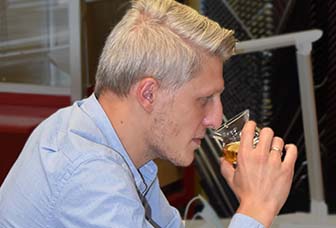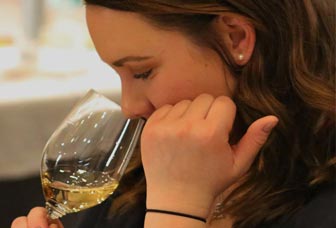

Year after year, the FLIWC draws a diverse panel of the highest quality judges from all over the world.
Judges for the Finger Lakes International Wine and Spirits Competition (FLIWC) are drawn from a wide set of qualified national (~ 75%) and international (~ 25%) wine and spirits professionals. They include Masters of Wine, Master Distillers, Sommeliers (CMS), Educators (SWE), journalists, winemakers, academicians, and other top internally certified judges, as well as WSET and MW students and graduates.
Judging Process
The FLIWC has earned great respect throughout the years. Those involved in the competition show consistent professionalism and altruism through the competition’s large monetary contribution to Camp Good Days and Special Times. The FLIWC has such a widely known reputation, we have evaluated up to 3,000 entries each year.
Judges are carefully selected and invited to apply. The competition typically involves 50 judges that are organized into panels of 3 or 4 that represent a mix of professions and geographic regions. Entries are judged ‘blind’ in flights by class with only non-specific information such as varietal, vintage residual sugar and % alcohol.
The FLIWC utilizes a ‘consensus’ judging process wherein each judge evaluates each wine or spirit independently. An experienced Panel Captain then conducts a discussion to arrive at a final determination for each entry.
Medals awarded include Bronze (commercially sound), Silver (meritoriously representative), Gold (exceptional in its class) and Double Gold (unanimously exceptional & remarkably distinctive). The newly added Platinum medal is awarded to the entry that holds extraordinary distinction during the "Best in Class" evaluation. Panel decisions are not altered or adjusted in any manner.
Wine Best-In-Class Awards Include: Riesling (Dry/Non Dry), Chardonnay (Oaked/Unoaked), Sparkling, Ice Wine, Fruit, Hybrid White, Hybrid Red, Cabernet Sauvignon, Cabernet Franc, Merlot, Vinifera Red Blend, Rosé, Pinot Noir and Mead.
Spirit Best-In-Class Awards Include: Brandy, Gin, Vodka, Rum, Bourbon, Whiskey, Flavored Whiskey, and Liqueur.
How We Judge Your Entries
- Each entry is judged on its own merit — its presence, balance and varietal character - not by how it compares to other entries in the flight.
- While it is common knowledge that wines and spirits go through various stages of quality development, each entry in the FLIWC is judged for what it is at the time of judging - not for what it might become in the future.
- Entries are blind judged in flights, with each wine identified only by a computer generated code number.
- Each glass is labeled with this code number and the judges are given a scoring sheet with the number and the variety of the entry.
- All flights are staged in a separate back room and delivered to the judging room. Re-pours, when necessary, from a second unopened bottle are also staged in the back room and delivered to the judging room.
- All entries are presented to the judges in professional crystal stemware.